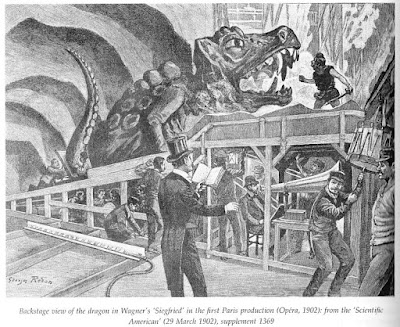I am going to write one post about Richard Wagner’s four Ring of the Nibelunga operas, or really the texts. To do that I need a translation, a book. The book is Wagner’s Ring of the Nibelung (1993), edited by Stewart Spencer and Barry Millington, which has German and English texts (translated by Spencer) side by side, along with a number of helpful essays about the operas’ sources, composition, performance, and also the minor side issue of the music. What a helpful book. The translator’s general method is to sound like he is translating the Poetic Edda, with punchy lines and lots of alliteration, while Wagner’s method was to sound like he was imitating the Poetic Edda.
Das Rheingold (1869), Die Walküre (1870), Siegfried and Götterdämmerung (both 1876). I have identified the dates of first performance, but the texts go back to the 1848, with some version of them published – without any music – as early as 1853. Wagner began with the idea of an operatic version of the great medieval German epic Die Nibelungenlied, but kept discovering that he needed to move backwards.
The history of the text and score, evolving over almost thirty years, gives Wagner experts a lot to do. My favorite part of this story is that Wagner insisted that his texts embodied the ideas of Ludwig Feuerbach, until he discovered the work of Arthur Schopenhauer, after which, having changed almost nothing, he claimed that the Ring exemplified the ideas of Schopenhauer. I assume Wagner was as right as wrong each time.
The Ring is a cosmological story, beginning, obliquely, with the creation and ending with the apocalypse. Less symbolically, a dwarf steals a gold treasure from some mermaids, and the pursuit of this treasure by various parties, especially the Norse gods, Wotan and so on, leads eventually to the destruction of the heroes and gods by fire. The dwarf puts a curse on the gold when, in Das Rheingold, it is seized from him by the might-makes-right gods, and supposedly this curse generates much of the subsequent action:
No joyful man
shall ever have joy of it;
on no happy man
shall its bright gleam smile;
may he who owns it,
and he who does not
be ravaged by greed! (Das Rheingold, Sc. 3, p. 98)
But one of the finest subtleties of Wagner’s conception is that there is no curse. No curse is needed to evoke ordinary human nature at its worst. Almost all of the characters – the dragon, the dwarfs, the gods – are credibly human.
The Ring is gigantic enough – Götterdämmerung in particular always seems like it will never end – to include many stories. The Ring is about many things. What struck me most strongly this time was what I will call the Tragedy of Wotan, the Shakespeare-like story of the king with too strong of a sense of fate, the existentialist Odin. He schemes, he acts, he even triumphs, but always with the knowledge that in the end, even for an all-powerful, all-knowing being, none of it matters:
How can I make that other man
who’s no longer me
and who, of himself, achieves
what I alone desire? –
O godly distress!
O hideous shame!
To my loathing I find
only ever myself
in all that I encompass! (Die Walküre , Act II, Sc. 2, p. 152)
What will strike me next time I read the Ring is anybody’s guess. Would a reading of the Ring plays have any meaning to someone who had no interest at all in the operas, the music? I don’t know. Probably not.
I found that backstage image of Siegfried slaying Fafner the dragon, as portrayed in Paris in 1902, in The New Grove Book of Operas, 2000 edition, p. 586.


The Nazis certainly thought there was a connection. Their more apocalyptic ideas are quite doomy and Norse.
ReplyDeleteLater today I am going to write about George Bernard Shaw writing about Wagner. Shaw saw a completely different connection between Wagner and modern events, that the Ring was a socialist response to 1848. His essay is great fun.
As the central idea of the Ring is that not even the gods can break a promise and get away with it, I don't think the nazis can have learned much from it.
DeleteYes, the Nazis were projecting, and not even creatively. Shaw is perhaps also projecting, but his ideas are more creative, and less evil.
Delete"Would a reading of the Ring plays have any meaning to someone who had no interest at all in the operas, the music?"
ReplyDeleteEventually to become a fairly "compleat" Wagnerian, I first read The Ring and became fascinated by it in a library book which contained only the translated texts along with illustrations by Arthur Rackham. I was in my early teens and enthusiastic about the works of Tolkien and Mervyn Peake (though I’m not sure how much the latter had to do with fostering Wagnerism).
For many years I used to amuse myself when finding a previously unknown or newly published book on Wagner by turning to the illustration section and seeing whether it contained more pictures showing Minna, RW's first wife, or Adolph Hitler, born 6 years after Wagner's death. Hitler often came out ahead.
ReplyDeleteMore pictures of Hitler, how awful, how ludicrous.
ReplyDeleteBill, a Tolkien interest makes a great deal of sense. I had not thought of that, but of course. Arthur Rackham would not hurt, either.
ReplyDeleteThe next lines of Alberich's curse, that I begin up above, are:
Doomed to die,
may the coward be fettered by fear;
as long as he lives,
let him pine away, languishing,
lord of the ring
as the slave of the ring:
till the stolen circlet
I hold in my hand once again!
I wish I had come across such a book as a teen.